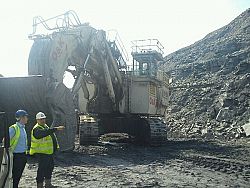

In order to rescue the UK steelmaker, British Steel, the Chinese firm Jingye has said it will invest £1.2 billion in a signed deal.
They seek to help preserve thousands of jobs, in what they refer to as a "key foundation industry for the UK", but didn't put a number on the full amount that would be saved. Currently, in both Scunthorpe and Teeside, they employ around 4,000 people. Following the company falling into liquidation in May, it had been kept running by the government via Official Receiver.
Jingye had said that it anticipated making as many job offers as possible, across as many business sectors as possible. The Group Chairman, Li Ganpo, said the company would spend £1.2 billion over the course of the next decade, in order to upgrade both plant and machinery, looking to improve the company's environmental performance and boost energy efficiency in order to place the operations on a more competitive and sustainable footing. They also want to identify both new markets and products.
Business Minister, Andrea Leadsom, met with Jingye's chairman on Monday and said "I have been given reassurances that next to all current staff will be kept and that in the medium to longer term they are likely to want to expand the workforce". The deal will give the Chinese company control of a third of the UK's steel industry. She added "there aren't any national security issues with this acquisition. In my dealings with Jingye, I think they will show themselves to be very committed to continued and expanded production [here] in Scunthorpe and on Teeside".
Jingye will acquire:
A statement from the Official Receiver said "completion of the contract is conditional on a number of matters, including gaining the necessary regulatory approvals. The parties are working together to conclude a sale as soon as reasonably practicable". They are going to continue to trade as normal during the period between the exchange and the completion, which is a critical factor in achieving this outcome through support from the employees, suppliers and customers since the liquidation.
This announcement was a great relief to many workers, who, up until the buyout, had been unsure of the current state of their jobs, and whether they could pay the mortgage, or feed their families. Gareth Stace, the director general of industry lobby group UK Steel, stated that the business being bought was a "significant asset to our country".
Stace now believes that the steel industry in the UK could compete globally, and pushed a new manifesto with ideas for change. Stating, "the problem we have is that we have an uncompetitive business landscape in the UK. Government can change that".
"I'm talking about energy costs, business rates, procurement - the government buying more steel from the UK - free and fair trade, and even much more support for R&D [research and development], which we are going to lose when we fall out of the EU".
Stace believes the government needs to provide a business landscape, so that the companies can thrive on the global market and generate some highly paid, and highly skilled jobs for the UK economy.
Jingye has promised to increase production, but stresses that costs may need to be cut. The UK market has been struggling for a number of years amid claims that China has been flooding the market with cheap steel. In 2016, the EU imposed tariffs of up to 73.7% on Chinese steel, after an influx of cheap imports from Asia forced European manufacturers to cut jobs and lower prices.